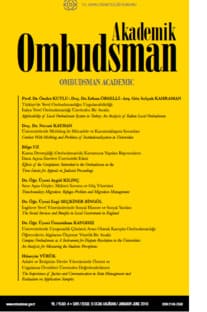YÖNETİŞİMİN KAMU KURUMLARINDA UYGULANABİLİRLİĞİ: YÜKSEKÖĞRETİM KURULU BAŞKANLIĞI ÖRNEĞİ
Applicability of Governance in Public Institutions: Sample of Head of Higher Education Committee
___
- AGENDA 21 (1992). United Nations Conference on Environment&Development, Rio de Janerio, http://sustainabledevelopment.un.org/content/documents/ Agenda21.pdf (Erişim Tarihi: 15.01.2014).
- BARANSEL, Atila (1979). Çağdaş Yönetim Düşüncesinin Evrimi Klasik ve Neo Klasik Yönetim ve Örgüt Teorileri, İstanbul Üniversitesi İşletme Fakültesi İşletme İktisadı Enstitüsü, İstanbul.
- BEVİR, Mark, (2009). Key Concepts in Governance, Sage Publication, India.
- BM (1996). İnsan Yerleşimleri Konferansı Habitat II Türkiye Ulusal Rapor ve Eylem Planı, (İstanbul).
- BRİGGS, Asa (2006). “The Welfare State in Historical Perspective” Pierson, Christopher ve Francis G. Castles (Ed.) The Welfare State: Reader, USA: 16-28.
- Commission of the European Communities (2001). European Governance – A White Paper, COM 428, http://eurlex.europa.eu/search.html?type=expert& qid=1399360618888, (Erişim Tarihi: 02.02.2014).
- Devlet Yükseköğretim Kurumlarında Öğretim Elemanı Norm Kadrolarının Belirlenmesine ve Kullanılmasına İlişkin Yönetmelik, R.G.: 02.11.2018, Sayı:30583.
- FREDERİCKSON, George H. (2004). Whatever Happened to Public Administration? Governance, Governance Everywhere, Working Paper, http://www. queens-belfast.com/schools/SchoolofLaw/Research/InstituteofGovernance/ Publications/briefingpapers/Filetoupload,47649,en.pdf, ( Erişim Tarihi: 05.02.2014).
- Governance and Development, COM (2003). 615 final, s.3, Communication from the Commission to the Council, The European Parliament and the European Economic and Social Committee, http://eur-lex.europa.eu/legalcontent/ EN/TXT/PDF/?uri=CELEX:52003DC0615&from=EN, (Erişim Tarihi: 02.02.2014).
- GÖZE, Ayferi (2010). Liberal Marxiste Faşist Nasyonel Sosyalist ve Sosyal Devlet, Beta Yayınları, İstanbul.
- JESSOP, Bob (1998). “The Rise of Governance and the Risks of Failure: The Case of Economic Development”, International Social Science Journal, 50 (155): 29-45.
- ISSN: 2148-256X
- Yayın Aralığı: 2
- Başlangıç: 2014
- Yayıncı: Kamu Denetçiliği Kurumu
İYİ YÖNETİŞİM İLKELERİ BAĞLAMINDA KAMU DENETÇİLİĞİ KURUMU: KAMU GÖREVLİLERİ ALGISI
İYİ YÖNETİŞİMİN TÜRK KAMU YÖNETİMİNDE UYGULANMASI VE KAMU DENETÇİLİĞİ KURUMU
YÖNETİŞİMİN KAMU KURUMLARINDA UYGULANABİLİRLİĞİ: YÜKSEKÖĞRETİM KURULU BAŞKANLIĞI ÖRNEĞİ
YEREL YÖNETİMLERDE DENETİM VE İYİ YÖNETİŞİM İLİŞKİSİ: MUĞLA BÜYÜKŞEHİR BELEDİYESİ ÖRNEĞİ
İNSAN HAKLARINI KORUMA MEKANİZMASI OLARAK OMBUDSMANLIK KURUMU: RUSYA FEDERASYONU ÖRNEĞİ
Elvettin AKMAN, Aizat CHIFTCHI
BİR İYİ YÖNETİŞİM İLKESİ OLARAK KATILIMCILIK VE TÜRK KAMU YÖNETİMİNDE KATILIMCILIĞIN KONUMU
Hamza ATEŞ, Gökçe Ceren BUYRUK
SAĞLIKTA DÖNÜŞÜM PROGRAMI VE KAMUNUN SAĞLIK HİZMETLERİNDEN MEMNUNİYETİ
Zeynep B. UĞUR, Abdullah TİRGİL
KAMU YÖNETİMİ AÇISINDAN DİJİTAL ZEKÂNIN İYİ YÖNETİME ETKİSİ
BAYRAM COŞKUN, ÇİĞDEM PANK YILDIRIM
